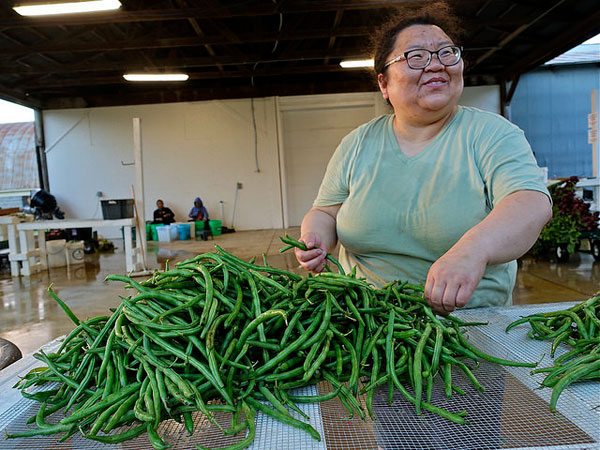
November 28, 2017; MinnPost
Minneapolis is home to the nation’s largest Hmong community, with 65,000 Hmong residing in the Twin Cities metro area, twice the level of second-place Fresno. In Laos, the Hmong sided with the United States in what is known as the “Secret War,” a conflict that paralleled the concurrent war in Vietnam. When the United States withdrew from southeast Asia, the Hmong were persecuted by the victorious Communists and over 100,000 Hmong became refugees. Some fled to France and Australia, but many came to the United States, with the Twin Cities becoming the leading resettlement site.
In Laos, most Hmong were farmers, a profession they have carried over to the United States. But it is hard to get access to land or markets, and accessing technical assistance is not so easy either, given linguistic barriers. But the Hmong American Farmers Association (HAFA), founded in 2011 and which recently won a $247,000 Bush Foundation Prize for Community Innovation (an amount equal to 25 percent of the organization’s previous year’s budget), is making succeeding at farming significantly easier for a group of over 100 Hmong farmers in the Twin Cities region.
Yasin Mohamud notes in MinnPost that Pakou Hang, HAFA’s cofounder and executive director, herself “comes from a family of farmers.” Hang began the organization after conducting a series of interviews with Hmong farmers. Hang notes that,
The creation of HAFA really was an act of self-determination, where people were saying, “We can save ourselves. We know what the problem is and we know what the solutions are and we have to work together.”
“Today,” Mohamud notes, “HAFA includes more than 100 farmers and is tackling the kind [of] issues that have been problems for decades—things like not having access to land or government programs designed for large commodity farming instead of small specialty crop farming—the kind of farming that most Hmong farmers engage in.”
One unique strategy employed by HAFA has been to purchase a 155-acre farm that can serve an entire community of farmers. Located in Dakota County, HAFA leases the land out to its members, who then sell their produce to a HAFA food hub that resells their products through community-supported agriculture shares, schools, and grocery stores.
Sign up for our free newsletters
Subscribe to NPQ's newsletters to have our top stories delivered directly to your inbox.
By signing up, you agree to our privacy policy and terms of use, and to receive messages from NPQ and our partners.
HAFA employs a staff of 12 for its business management education and support work. The organization also advocates on behalf of its farmers, including successfully pushing the “Minnesota Department of Agriculture to create microloan programs for immigrant farmers,” as the Asian American Press notes. Further, HAFA maintains community partnerships; for example, as the National Farm to School Network published last year, “Since 2014, HAFA has sold broccoli, beets, carrots and more to the Ramsey County Head Start program to serve to its children during mealtimes. In addition to providing fresh, local produce, HAFA has partnered with the Head Start program to provide educational opportunities and activities to engage its young students, teachers, food workers and parents around eating healthy food.”
The impact of Hmong farmers overall in the Twin Cities’ local food economy is significant. According to Hang, Hmong American farmers “make up more than 50 percent of all the farmers in metropolitan farmers markets.”
Lee Pao Xiong, director of the Center for Hmong Studies at Concordia University in St. Paul, noted in an interview with Minnesota Public Radio a couple of years ago that Hmong come from a “collective society.” HAFA’s structure of community ownership of land fits the common sense of Hmong culture.
Indeed, Duchesne Drew, Community Network Vice President for the Bush Foundation, highlighted this as a reason for the foundation’s award. “HAFA stood out…because they were able to demonstrate that they do their work in a collaborative and resourceful manner. It’s in their DNA. It’s who they are. Their work is changing lives and changing systems by creating a more equitable system for Hmong farmers.”
Hang emphasizes the contrast of HAFA’s work to that of traditional economic development strategy:
When we think of traditional economic development, we often ask “Who can we attract to our community,” right? What we’ve done at HAFA is say, “Let’s look at who lives in the community right now and ask them about their hopes and challenges and how do we build them up.”
Hang sees even greater possibilities ahead that extend far beyond helping boost a group of Hmong farmers: “I hope that HAFA helps spur a revitalization of what we think of as wealth in our community…that it’s not just about income that I’m earning myself, it’s about what I’m building to multiply prosperity for the entire community and to lift others up as well.”—Steve Dubb













